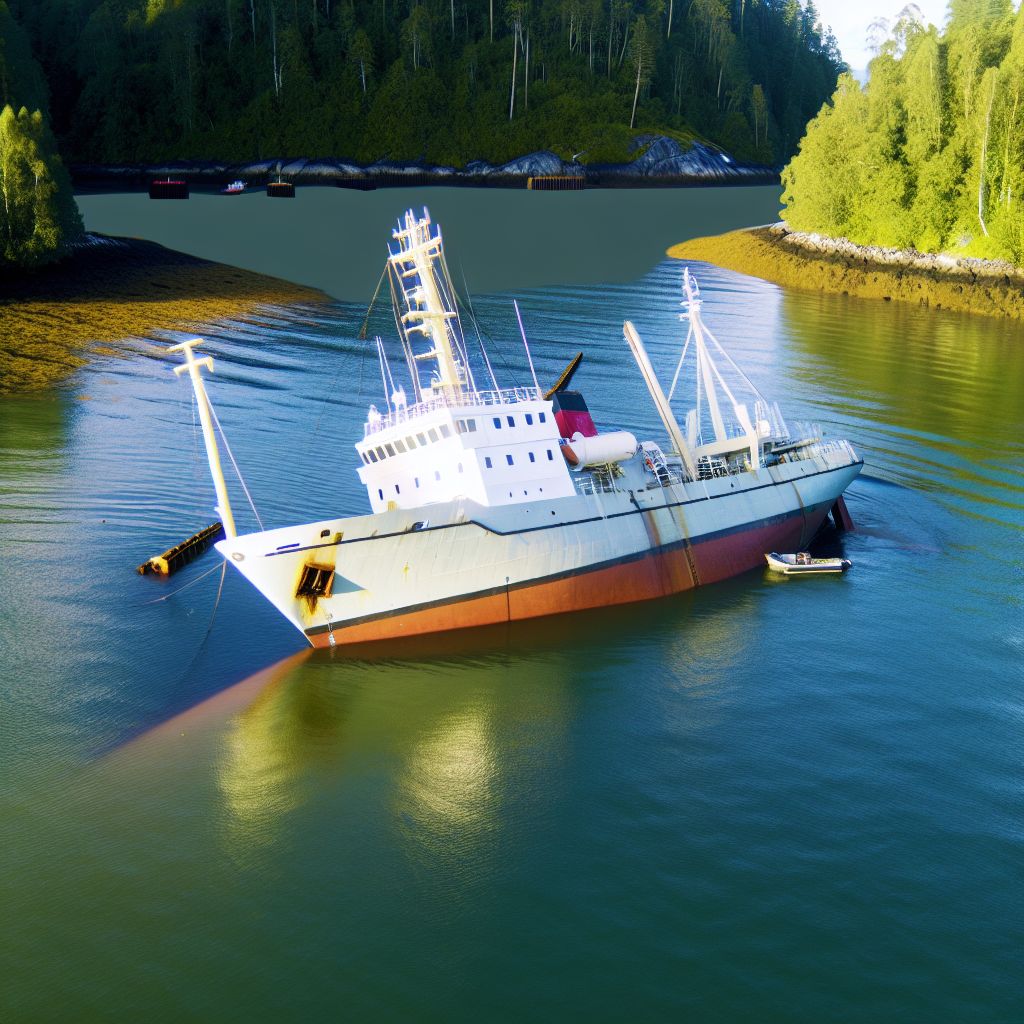Deutsch: Grundberührung / Español: Varada / Português: Encalhe / Français: Échouement / Italiano: Incaglio
Grounding in the maritime context refers to an incident where a ship or boat touches the bottom of a body of water, causing it to become stuck. This situation typically occurs when the vessel strays outside of the deepwater channels and comes into unintentional contact with shallower areas like sandbars, reefs, or the seabed. Grounding can result in varying degrees of damage to the vessel, depending on factors such as the speed at which the ship was moving and the nature of the seabed.
Description

Grounding is considered a serious navigational accident in maritime operations, potentially leading to significant structural damage to a ship. It can also pose environmental risks if it results in the spillage of oil or other hazardous materials. Groundings are often caused by human error, navigational mistakes, or environmental conditions such as poor Visibility or unexpected changes in the seabed.
Application Areas
Grounding incidents can affect various types of vessels and watercraft across different sectors:
- Cargo Ships: Large vessels might ground in narrow channels or harbors if they stray from designated pathways or if there is an error in tide calculation.
- Cruise Ships: These can run aground if they are too close to shore or if the captain fails to navigate safely within confined waters.
- Fishing Boats: Smaller and more maneuverable, yet still at risk, especially in poorly charted waters or during stormy conditions.
- Personal Yachts and Small Boats: Often ground on beaches or sandbars, especially in areas where the water depth changes rapidly and unexpectedly.
Well-Known Examples
- Costa Concordia Disaster (2012): This cruise ship grounded off the coast of Italy, leading to a significant loss of life and environmental damage.
- Exxon Valdez Oil Spill (1989): One of the most notorious grounding incidents that resulted in a massive oil spill, causing extensive environmental damage in Prince William Sound, Alaska.
Treatment and Risks
Managing a grounding incident involves several critical steps and considerations:
- Immediate Response: The first priority is to ensure the safety of all passengers and crew, followed by an assessment of the hull's integrity to prevent sinking.
- Damage Control: Efforts to control any breach and prevent flooding within the ship are crucial.
- Environmental Impact: Quick action may be required to manage any spillage of oil or chemicals, which includes deploying containment booms and other mitigation techniques.
- Salvage Operations: Depending on the severity, specialized salvage vessels and techniques may be needed to refloat the ship and repair damage.
Similar Terms
- Beaching: Intentionally grounding a boat or ship on a beach. This is often done for maintenance or demolition purposes.
- Stranding: Similar to grounding but refers to a ship that is unable to move under its own power due to contact with the ground.
Weblinks
- top500.de: 'Grounding' in the glossary of the top500.de
- psychology-lexicon.com: 'Grounding' in the psychology-lexicon.com
Summary
In the maritime industry, grounding is a critical incident where a ship or other watercraft makes contact with the bottom of a water body and becomes immobilized. This event requires immediate and careful handling to ensure the safety of everyone on board, minimize environmental impact, and salvage the vessel if possible. Grounding can lead to significant mechanical and structural challenges for the ship involved and is a scenario that all maritime professionals strive to avoid through careful navigation and adherence to Maritime safety practices.
--
Related Articles to the term 'Grounding' | |
| 'Disaster' | ■■■■■■■■■■ |
| Disaster: In the maritime context, a disaster refers to a catastrophic event or situation that causes . . . Read More | |
| 'Accident' | ■■■■■■■ |
| Accident: An accident, mishap, or, more archaically, misadventure, is an unforeseen and unplanned event . . . Read More | |
| 'Spill' | ■■■■■■■ |
| Spill in the maritime context refers to the accidental release of liquids, typically oil or chemicals, . . . Read More | |
| 'Human Error' | ■■■■■■■ |
| Human Error in the maritime context refers to mistakes or failures made by individuals that can lead . . . Read More | |
| 'Navigational Hazards' | ■■■■■■ |
| Navigational Hazards: Navigational hazards in the maritime context refer to any obstacles, conditions, . . . Read More | |
| 'Harm' | ■■■■■ |
| Harm in the Maritime context refers to any Damage, Injury, or negative Impact affecting ships, Crew members, . . . Read More | |
| 'Environmental Impact' | ■■■■■ |
| Environmental Impact in the maritime context refers to the effects that maritime activities have on the . . . Read More | |
| 'Destruction' | ■■■ |
| Destruction in the maritime context refers to the Damage or complete obliteration of marine environments, . . . Read More | |
| 'Costa Concordia Disaster' | ■■■ |
| Costa Concordia Disaster refers to a significant maritime incident that occurred on January 13, 2012, . . . Read More | |
| 'Hazard' | ■■ |
| Hazard: A hazard is a potential source of Harm. Substances, events, or circumstances can constitute hazards . . . Read More | |